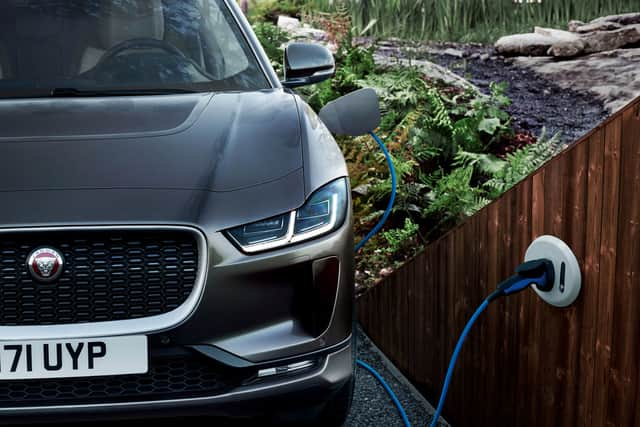EV charging: how much will it cost to charge an electric car under October 2022 Energy Price Guarantee?
Electric car drivers have been given some respite from the threat of soaring charging costs with the announcement of the Energy Price Guarantee.
The recently announced cap on how much energy firms can charge customers means motorists won’t be hit with the full force of Ofgem’s latest price cap increase, which was due to take effect in October.
Advertisement
Hide AdAdvertisement
Hide AdThat 52p/kWh cap would have seen the cost of charging an EV at home jump by around 84% compared with current costs and its announcement led to warnings that drivers could be put off switching to an EV by soaring costs.
Under the price guarantee, domestic electricity costs will be capped at 34p/kWh, meaning drivers will pay around a third less than they would have under the Ofgem cap.


That means from 1 October, the cost of fully charging an average EV with a 64kWh battery, such as a Kia e-Niro, will rise from £18.37 (under the current cap) to £22.22 - significantly less than the £33.80 it would have cost at 52p/kWh. At last winter’s price cap, the same car would have cost £13.69 to charge from 0-100%.
EV sales have soared over the past year but some industry observers are worried that as running costs creep closer to those of petrol and diesel cars, some buyers could be put off switching to an EV.
Advertisement
Hide AdAdvertisement
Hide AdPart of the appeal of EVs for many drivers has been the lower per-mile running costs compared with petrol and diesel vehicles. While the new price guarantee softens the latest increases, the gap between fuelling costs for EV and petrol cars is narrowing, especially as fuel prices continue to fall - down to an average of £1.68 per litre.
RAC EV spokesperson Simon Williams said even with the latest changes EV running costs remained good value. He said: “The 34p per kilowatt hour (kWh) Energy Price Guarantee will significantly cushion the impact of rising energy prices affecting drivers of electric cars.
“From 1 October it will cost on average £22.22 to fully charge a typical 64kWh family-sized electric SUV, £3.85 more than it does currently, and a third less than it would have cost under the new cap that was announced by Ofgem on 26 August. Drivers will need to contact their energy provider to confirm the exact price of their new tariff.”
Rising running costs
Ben Nelmes, co-founder and head of policy at green consultancy New AutoMotive, said: “Even with rising electricity prices, EVs will continue to be much cheaper to run than petrol or diesel cars. There are still great offers for EV electricity tariffs to further reduce the cost of charging. EVs can and should be part of the solution to the cost-of-living crisis.”
Advertisement
Hide AdAdvertisement
Hide AdIn most cases, under the new price guarantee, EVs will remain cheaper to run on a per-mile basis than an equivalent petrol car, even as petrol prices fall. Based on official consumption figures, a 34p/kWh electricity rate, petrol priced at £1.68 per litre and diesel at £1.83 (the averages on 12 September), a Renault Zoe EV will cost 7.4p per mile while a similar-sized petrol Vauxhall Corsa will cost 12p per mile. A Nissan Leaf e+ will cost 8.4p per mile under the new cap while a diesel Ford Focus will cost 10.8p per mile.
Loading....
The latest figures are based on the 34p/kWh limit set in the price guarantee but some energy suppliers have favourable EV tariffs for owners who charge at off-peak times, with rates as low as 7p per kWh. However, many suppliers, including British Gas and EDF, have suspended sales of the tariffs to new customers.
Emily Seymour, energy and sustainability editor at consumer group Which?, said rising costs could put some motorists off changing to an EV. She said: “A big part of the electric vehicle appeal has always been lower running costs, but these price rises could jeopardise more people making the switch to electric cars.
“In a recent survey, we found that the upfront cost of buying an EV is the biggest barrier preventing drivers from considering an electric vehicle – and this latest energy price rise could further prevent people from making the switch.”
Advertisement
Hide AdAdvertisement
Hide AdPublic charging costs rising
The RAC said that drivers who need to charge away from home won’t escape price rises either and called for action to cut costs at public chargers. Users charging at many rapid chargers are already facing per-mile costs higher than for many petrol or diesel vehicles.
The RAC’s Rod Dennis said: “We’re aware that public chargepoint operators are having no choice but to increase their prices to reflect the rising wholesale costs they’re faced with, which will heavily impact drivers who have no choice other than to charge up away from home.
“The RAC continues to support FairCharge’s campaign for the Government to cut the VAT rate levied on electricity from public charge points to 5%, to mirror the rate charged on domestic electricity.”
Chargepoint operator Instavolt, which recently put its prices up to 66p/kWh, said that if the Government were to cut VAT to 5%, its costs would fall to 58p/kWh. The Government has previously ruled out any such change in VAT rates.
Comment Guidelines
National World encourages reader discussion on our stories. User feedback, insights and back-and-forth exchanges add a rich layer of context to reporting. Please review our Community Guidelines before commenting.
